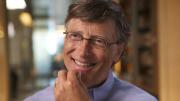Several hundred Harvard students got a thrill on Thursday when Microsoft co-founder Bill Gates ’77, LL.D. ’07, came to campus. After touring the Harvard Paulson School of Engineering and Applied Sciences (SEAS), where he learned about mechanical bees and soft robots that can gently grasp delicate objects, Gates engaged in a wide-ranging Q & A at the Science Center with the students, who came from throughout the University. Asked about parenting, he said his wife does “80 percent of it.” Regrets from his undergraduate years? “Not socializing enough.” Gates was introduced by University provost Alan Garber, a College classmate who praised him in particular for the rigorous, data-driven approach that he and his wife have taken to allocating and measuring the effects of their philanthropy through the Bill & Melinda Gates Foundation. What emerged from the session was Gates’s sense of the sharp contrast between the success of their efforts to reduce inequities and improve outcomes in global health, and the challenges of achieving similar returns in the realm of education, specifically in the United States.
During the Q & A, which was interspersed with anecdotes from his undergraduate years (when he famously attended only classes in which he was not enrolled; see “Bill Gates at Harvard”), SEAS dean Frank Doyle asked him what he thought about MOOCs (massive open online courses). Gates answered by comparing them to other means of learning, such as reading books. “A MOOC doesn’t change what counts” he said, pointing to the aptitude and motivation of the learner as highly important, but MOOCs are a “slightly more digestible type of learning.” He himself takes four to five online courses a year, he revealed. “People call me a dropout, but I like going to college more than anyone!”
In response to a student question about the education system in the United States, Gates noted that 20 percent of the total funding his foundation provides globally goes toward education in the U.S. That, he explained, is because the lack of research and development funds to spark innovations that might improve educational outcomes is a classic market failure. In all, the Gates Foundation spends $800 million a year on education domestically—the aim has been to push the United States up to become one of the top three countries with the best educational systems. But even after 20 years of working in that area, he said, the results have been almost unnoticeable. That’s been a disappointment in a country dedicated to the proposition of equity of opportunity.
In contrast, “the statistic” he is “most proud of” (a response to another student question) is the reduction in the global death rate of children under five. By 2030, he said, that rate is projected to halve again, when only 2 percent of children worldwide will die before the age of five, nearly matching the 1 percent level found in the world’s richest countries.
Gates underscored the differences between global health and education in responding to a question from a middle-school art teacher now studying at the Graduate School of Education, who asked what he thought about teacher pay. He responded with an analysis of the structural issues that make effecting change in that area so difficult. Taking K-12 education as an example, he explained that funding for public goods at the state level—which is dependent on tax revenue—is flat. Meanwhile, pension and healthcare costs continue to rise, putting pressure on other parts of state budgets. That means education budgets, far from being expanded, are at risk in some cases of being cut. Unless a state government is willing to increase taxes to raise new revenue—which means “a political fight,” he said—education cannot grow. Gates is in favor of increasing certain taxes—including on inheritances—though he admits that among his financial peers, “It’s a lonely thing to be pro-tax.”
The visit ended with a final question from a freshman studying cell biology, who asked Gates what field he would go into today, if he were once again an undergraduate about to embark on his career. Gates, who once thought he would become a professor of mathematics, replied that he would again go into software—but not the kind that was cutting edge when he was in college. Back then, the frontier was defined by the technological shift Gates foresaw: from mainframe to personal computers. Today, the future is not software to run the now ubiquitous PCs. Instead, Gates explained, the future is artificial intelligence: designing the software to run autonomous thinking machines. Perhaps even for robots, like those he’d seen earlier that day….









